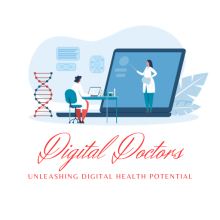Inspirational journeys
Follow the stories of academics and their research expeditions
Common Challenges in Healthcare Digitization and How to Overcome Them: A Detailed Case Study

Introduction
Healthcare digitization has the potential to revolutionize
patient care, operational efficiency, and data-driven decision-making. However,
the journey is complex, with challenges ranging from legacy systems and
regulatory issues to cost and staff resistance. This case study explores
real-world examples of these challenges and presents practical solutions to
help organizations achieve successful digital transformation.
Case Study: Digital Transformation Journey at MedTech
Hospital
Background
MedTech Hospital, a 350-bed facility in a mid-sized city,
embarked on a digitization journey with the goal of improving patient care,
reducing operational costs, and complying with regulatory standards. Their plan
included an electronic health record (EHR) system, a telemedicine platform, and
a data analytics framework. Along the way, they encountered significant
obstacles.
Challenge 1: Legacy System Integration
Description: MedTech Hospital’s various legacy
systems were not compatible with the new EHR, resulting in data silos and
access delays.
Solution: The hospital implemented middleware
solutions and partnered with healthcare IT consultants to streamline
integration.
Takeaway: Middleware and expert assistance can bridge
legacy systems, but meticulous planning is essential to minimize disruptions.
Challenge 2: Data Security and Privacy
Description: Ensuring data security and regulatory
compliance, especially with HIPAA, was a significant challenge for MedTech.
Solution: They adopted advanced encryption,
multi-factor authentication, and conducted staff training on cybersecurity best
practices.
Takeaway: Prioritizing data security and training
builds a culture of cybersecurity and protects sensitive data.
Challenge 3: Change Management and Staff Resistance
Description: The new technology altered workflows,
leading to resistance from both clinical and administrative staff.
Solution: MedTech emphasized change management,
involving key stakeholders from the start, providing hands-on training, and
promoting the benefits for patient care.
Takeaway: Effective change management fosters staff
buy-in and smooth transitions to digital workflows.
Challenge 4: Cost of Implementation
Description: MedTech underestimated the total costs,
including indirect expenses such as training and temporary productivity dips.
Solution: After re-evaluating their budget, MedTech
secured additional funding through state health IT grants and worked with
vendors offering flexible payment options.
Takeaway: Account for both direct and indirect costs
and explore funding opportunities with grants and vendor partnerships.
Challenge 5: Regulatory Compliance
Description: Compliance with regulations on data use,
interoperability, and patient consent posed significant obstacles.
Solution: MedTech’s compliance and legal teams
collaborated with IT to ensure regulatory alignment, with periodic audits for
ongoing compliance.
Takeaway: Involving legal and compliance experts from
the beginning ensures regulatory alignment and minimizes compliance risks.
Challenge 6: Patient Engagement and Adoption
Description: The patient portal had low engagement,
particularly among older adults and underserved community members.
Solution: MedTech initiated community-based digital
literacy programs and gathered user feedback to enhance the portal’s usability.
Takeaway: Patient engagement requires education and
accessible design, ensuring that tools are user-friendly for diverse
populations.
Invaluable Takeaways for Healthcare Organizations
- Engage
Key Stakeholders Early: Involving all departments ensures a
collaborative and coordinated approach.
- Make
Data Security a Top Priority: Implement robust cybersecurity measures,
including regular staff training and access controls.
- Invest
in Change Management: Clear communication, training, and support help
staff embrace new technologies.
- Plan
Comprehensive Financial Projections: Anticipate hidden costs and seek
partnerships or funding options to ease the financial burden.
- Adopt
a Patient-Centric Design: Educate patients on digital tools and
incorporate their feedback to improve usability.
- Ensure
Continuous Monitoring and Compliance: Regular audits and close
collaboration with compliance teams help organizations stay ahead of
regulatory requirements.
Curated Online Resources for Further Reading
- Healthcare
Information and Management Systems Society (HIMSS)
HIMSS Digital Health Transformation Resources
This collection from HIMSS offers frameworks, case studies, and tools to support digital transformation in healthcare. - The
Office of the National Coordinator for Health Information Technology (ONC)
ONC Health IT Regulations and Guidance
The ONC provides resources on health IT laws, interoperability, and cybersecurity best practices for healthcare organizations. - American
Hospital Association (AHA)
AHA Innovation and Digital Health Resources
The AHA’s resources include insights and tools to assist healthcare organizations in adopting digital health technologies. - Centers
for Medicare & Medicaid Services (CMS)
CMS Digital Health Guidance
CMS provides information on standards, reimbursement, and policies to guide healthcare providers in digital transformation. - National
Institute of Standards and Technology (NIST)
NIST Cybersecurity Framework
NIST’s framework offers comprehensive guidance on cybersecurity measures to protect healthcare data. - American
Telemedicine Association (ATA)
ATA Telemedicine and Digital Health Resources
ATA provides resources, policies, and professional development materials for telemedicine and digital health.
Conclusion
Digitization in healthcare presents unique challenges but
can yield profound benefits when approached with a well-planned strategy. By
addressing issues like legacy system integration, data security, cost, and
patient engagement, healthcare organizations can drive innovation, enhance care
quality, and meet regulatory standards.
Tags:
healthcare digitization challenges healthcare digital transformation overcoming digital healthcare barriers healthcare technology case study healthcare digitization strategies0 Comments
Categories
- Career Development and Opportunities in Digital Health 166
- White Papers 39
- IELTS For Medical Professional 35
- OET Exam Preparation 30
- Entrepreneurship and Innovation 26
- Healthcare Innovation 17





Leave a comment